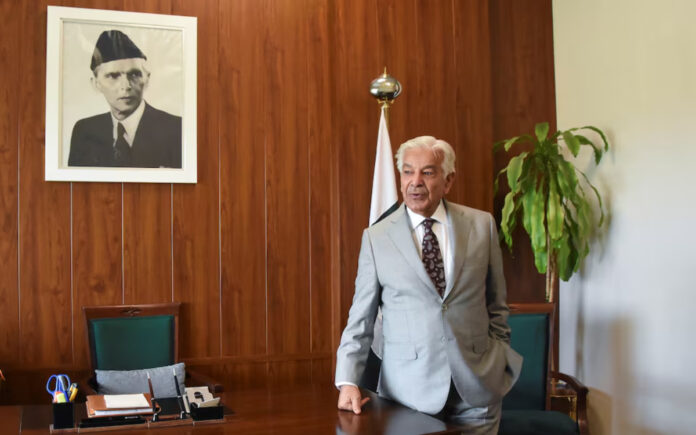Islamabad: Pakistan’s Defence Minister Khawaja Muhammad Asif has warned that a military incursion by India appears imminent, following a deadly militant attack on tourists in Kashmir that has sharply escalated tensions between the two nuclear-armed neighbors.
The attack, which left 26 people dead, sparked widespread outrage across Hindu-majority India and fueled calls for retaliatory action against Muslim-majority Pakistan. India has long accused Pakistan of supporting militant groups operating in the disputed Kashmir region, which both countries claim and have fought two wars over.
Pakistan’s Defense Minister warned that a military incursion from India is ‘imminent’ following a deadly militant incident in Kashmir. He said Pakistan’s military has briefed the government and is on high alert, ready to respond if attacked https://t.co/FqnmXVShxw pic.twitter.com/sYw3ireSx7
— Reuters (@Reuters) April 29, 2025
“We have reinforced our forces because it is something which is imminent now. So in that situation some strategic decisions have to be taken, so those decisions have been taken,” Asif said in an interview with Reuters at his office in Islamabad.
Asif noted that India’s rhetoric was becoming increasingly aggressive and that Pakistan’s military had briefed the civilian government on the likelihood of an Indian military action. However, he did not elaborate further on the specifics behind his assessment.
India’s foreign and defence ministries did not immediately respond to requests for comment.
Following the Kashmir attack, Indian authorities claimed that two suspected militants involved were Pakistani nationals. Islamabad firmly rejected the accusations, calling for a neutral and independent investigation into the incident.
Indian Prime Minister Narendra Modi has vowed to pursue and punish those responsible for the attack.
While Pakistan remains on high alert, Asif emphasized that the country would resort to its nuclear arsenal only if faced with “a direct threat to our existence.” A seasoned politician and senior member of the ruling Pakistan Muslim League-Nawaz (PML-N) party — historically known for advocating dialogue with India — Asif’s comments underscored the gravity of the situation.
Diplomatic Outreach and Regional Concerns
Asif added that Pakistan had reached out to friendly nations, including Gulf states and China, and had briefed Western powers such as Britain and the United States on the escalating crisis.
“Some of our friends in the Arabian Gulf have talked to both sides,” he said, without disclosing which countries were involved.
China, Pakistan’s close ally, called for restraint from both sides on Monday and welcomed all measures aimed at de-escalating tensions. Asif also noted that the United States appeared to be maintaining a hands-off approach so far.
Also Read | Franco-Spanish Grid Disconnection Leads to Major Iberian Outage
U.S. President Donald Trump remarked last week that India and Pakistan should “figure out” their relationship independently. However, the U.S. State Department later clarified that Washington remains in touch with both countries, encouraging them to seek a “responsible solution” to the crisis.
Historically, the United States has played a mediating role during previous periods of heightened Indo-Pakistani tensions. Since gaining independence from Britain in 1947, the two nations have experienced repeated cycles of hostility and conflict.
Strained Relations and Water Disputes
In the wake of the Kashmir attack, both Delhi and Islamabad have taken a series of retaliatory steps. India has suspended the Indus Waters Treaty — a crucial river-sharing agreement mediated by international guarantors. In response, Pakistan has closed its airspace to Indian commercial airlines.
Calling India’s move to restrict river water an “act of war”, Asif stressed the seriousness of tampering with water supplies critical to Pakistan’s vulnerable regions.
Also Read | Putin Announces Three-Day Ceasefire to Mark Soviet Victory Amid Ongoing War
“We have already gone to relevant quarters as far this treaty is concerned,” he said, urging the international community, particularly the World Bank, which brokered the Indus Waters Treaty, to intervene and uphold the pact.
Relations between India and Pakistan have remained fraught for decades, exacerbated by accusations such as India’s claims that Pakistan backed Islamist militants responsible for the 2008 Mumbai attacks, which killed more than 166 people, including several foreign nationals. Pakistan continues to deny all such allegations.



